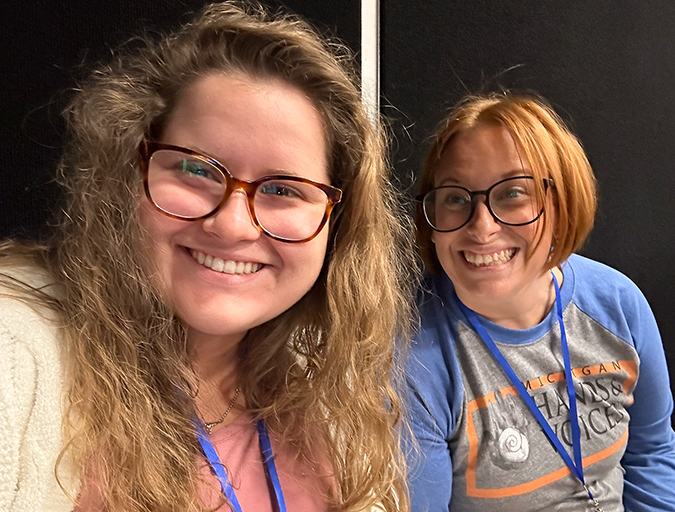What is an Accessibility Coordinator?
By Lillian Diuble, Michigan H&V

Still, shouldn’t we be mindful to create positions for people from diverse backgrounds so they can take a lead role in making our world a more welcoming, representative place?
There is a reason I am so passionate about accessibility. I was born deaf and have been wearing hearing aids since I was six months old. When I was three, my doctors realized that I had a vision loss, and I started wearing glasses. Doctors believed I had Usher Syndrome, a retinal degenerative disease where people become blind and deaf in their lifetime. While this diagnosis devastated my family, we turned to the Foundation Fighting Blindness (FFB) to help raise money for research and treatments for blinding eye diseases like mine. While I wasn’t formally diagnosed with Usher Syndrome, we still wanted to continue to fund research through partnering with FFB. A few years ago, formal testing found that I have an even more rare genetic eye disease called PRPS1. There is no treatment or cure for PRPS1. The last known study found only nine women in the world. My genetic eye condition hopefully gives more context about why I think accessibility is vital.
In July of 2020, I joined Michigan Hands & Voices as a Deaf/Hard of Hearing (DHH) Guide. I have had the privilege of sharing my personal experiences and the story of growing up with hearing loss, in a hearing-dominant family and world at large.
This past June, I was offered the role of Accessibility Coordinator, representing DeafBlind Central, Michigan’s DeafBlind Project. In this role, I closely looked at the chapter’s summer events for accessibility with a fine-tooth comb. I wanted to be sure that our events were welcoming and inclusive, and accessibility requests were handled with care. I hoped that the way we shared events would lead to greater attendance by DeafBlind families and those with other unique needs. I made sure interpreters were scheduled, interveners were contacted, and family requests were triple checked. If I didn’t know the answer or service requested, I wasn’t shy about asking. I was an additional advocate, and I was proud to make sure that the stars aligned from an accessibility standpoint.
Our larger events came at the end of the season, called Summer Parties. Our goal is to host one in each region, with three last season: North, West, and East Michigan. As I was bringing an accessibility lens to events, I researched some fun activities for kids, regardless of ability. I was so excited to offer real inclusion for our DeafBlind families and was thrilled that my job included going the extra mile for ALL of our kids.
As the only one in my community with combined hearing and vision loss, I know what it is like to feel isolated. My goal was to invite Parent Guides and other adults whose children identify as DeafBlind to show better representation of DeafBlind people in our smaller community. Why not create a natural way for parents to connect and ask questions during events? By early August, I announced to my team that I was able to get DeafBlind representation at all of our Summer Parties! Families felt so empowered by meeting each other and the DeafBlind representatives, knowing that others just “get” their child’s experience. Our DB representatives led activities with families during all summer events. DeafBlind Central was well-represented and our community was ecstatic.
As part of the DB Central grant, I was able to represent Michigan H&V at the Hands & Voices Leadership Conference. I was able to connect with others, including DHH leaders providing family support across the wide network. I enjoyed my time in Spokane and hope to attend and present at future Leadership Conferences as I am able.
Throughout the summer, I also focused on accessibility planning for the annual Trivia Night fundraiser held in late October (and I participate on the fundraising team). To bring visibility and natural interaction with guests, we asked DHH adults and teens to be our “runners” for the event, bring answers to the front, and answering questions. Guests, including family members, friends, professionals, and the general public, were so pleased to have a chance to visit with their “runners”. Access included captioning, speaker systems, interpreters, adequate lighting for the slides, walking areas free from tripping hazards, and more.
It takes a lot of thought and planning to make the world more accessible for all. I also realized that implementing plans for all these accommodations takes time and skills that not everyone has, which is understandable. Still, shouldn’t we be mindful to create positions for people from diverse backgrounds so they can take a lead role in making our world a more welcoming, representative place? I think so, and I don’t think I am alone in this ongoing battle for accessibility. One of my little catchphrases that I learned from school is to make sure that everyone has a seat at the table, a key concept in accessibility design.
While the grant work has ended, continued accessibility planning continues on. I have started implementing this thought process into my newer work as a DB Guide while continuing the Accessibility Coordinator position that I still hold. I am incredibly grateful to Michigan Hands & Voices for taking a chance on this position, giving me the platform to realize my passion, and for investing in greater accessibility. I can’t wait to keep going! ~
Editor’s Note: Lillian (Lilly) Double, CNP is a Board Member, DHH Guide, DB Guide, & Accessibility Coordinator for Michigan H&V.
H&V Communicator – Winter 2024/25